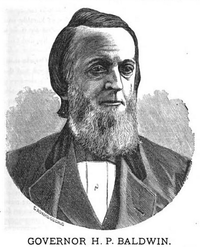Henry P. Baldwin
| Henry P. Baldwin | |
|---|---|
 | |
| 15th Governor of Michigan | |
|
In office January 6, 1869 – January 1, 1873 | |
| Lieutenant | Morgan Bates |
| Preceded by | Henry H. Crapo |
| Succeeded by | John J. Bagley |
| United States Senator from Michigan | |
|
In office November 17, 1879 – March 4, 1881 | |
| Preceded by | Zachariah Chandler |
| Succeeded by | Omar D. Conger |
| Personal details | |
| Born |
February 22, 1814 Coventry, Rhode Island |
| Died |
December 31, 1892 (aged 78) Detroit, Michigan |
| Political party | Republican |
| Spouse(s) |
1. Harriet M. Day 2. Sibyle Lambard |
| Religion | Episcopal |
Henry Porter Baldwin (February 22, 1814 – December 31, 1892), a descendant of pilgrim father Nathaniel Baldwin, was the 15th Governor of Michigan and U.S. Senator from the state of Michigan.
Early life in Rhode Island
Baldwin was born to John and Margaret (Williams) Baldwin in Coventry, Rhode Island and attended the common schools. He worked as a store clerk in Pawtucket from age 12 to age 20, after which he engaged in his own business for several years in Woonsocket. In 1835, he married Harriet M. Day (deceased 1862). He married his second wife, Sibyle Lambard, in 1864, who survived him.
Life and politics in Michigan
Baldwin moved to Detroit, Michigan, where he established a wholesale business in boots and shoes in 1838. He was a member of the convention which organized the U.S. Republican Party in Jackson, Michigan in 1854. He was influential in organizing the sixth Episcopal parish in the northern outskirts of Detroit on December 27, 1858, and in building St. John's Episcopal Church for the parish. Baldwin donated the church lot and underwrote a large portion of the cost of building a chapel to seat 125 persons (completed November 1859) and paid for the construction of the rectory. He also contributed in large part to the building of the larger 1300 seat nave, completed in 1861. He was the Senior Warden from the parish's founding until his death.
He was director of the Michigan State Bank and president of the Second National Bank of Detroit, 1863-1887. For several years, he was also the director of the Eastern Asylum in Pontiac. He was a member of the Michigan State Senate, 2nd District, 1861-1862. He married his second wife, Sibyle Lambard, on November 21, 1866.
In 1868, Baldwin was elected Governor of Michigan, serving from 1869 to 1873. In 1870, the woman suffrage amendment was passed by the Michigan Legislature, but was vetoed by Baldwin. Four years later, he was appointed and subsequently elected as a Republican to the United States Senate to fill the vacancy caused by the death of Zachariah Chandler, serving from November 17, 1879 to March 4, 1881 alongside Thomas W. Ferry. He became Chairman of the Michigan Republican Party from 1880 to 1882.
Retirement and death
Baldwin was not a candidate for reelection to the Senate and resumed his former business pursuits, serving as president of the Detroit National Bank, 1883-1887. He died in Detroit and is interred in Elmwood Cemetery.
References
- Bingham, Stephen D. (2005) [1888]. "s.v. Henry P. Baldwin". Early history of Michigan, with biographies of state officers, members of Congress, judges and legislators. Pub. pursuant to act 59, 1887. Ann Arbor, Mich.: University of Michigan Library. pp. 63–64. Retrieved 2007-01-12.
- Lanman, Charles (2005) [1871]. "Biographical History of Michigan". The red book of Michigan; a civil, military and biographical history. Ann Arbor, Mich.: University of Michigan Library. p. 418. Retrieved 2007-04-14.
- Henry P. Baldwin at the Biographical Directory of the United States Congress
- The Political Graveyard
- St. John's Episcopal Church, founded by Gov. Baldwin
| Political offices | ||
|---|---|---|
| Preceded by Henry H. Crapo |
Governor of Michigan 1869–1873 |
Succeeded by John J. Bagley |
| United States Senate | ||
| Preceded by Zachariah Chandler |
U.S. Senator (Class 1) from Michigan 1879–1881 Served alongside: Thomas W. Ferry |
Succeeded by Omar D. Conger |
| Party political offices | ||
| Preceded by James McMillan |
Chairman of the Michigan Republican Party 1880– 1882 |
Succeeded by Edward S. Lacey |
| ||||||||||||
|

